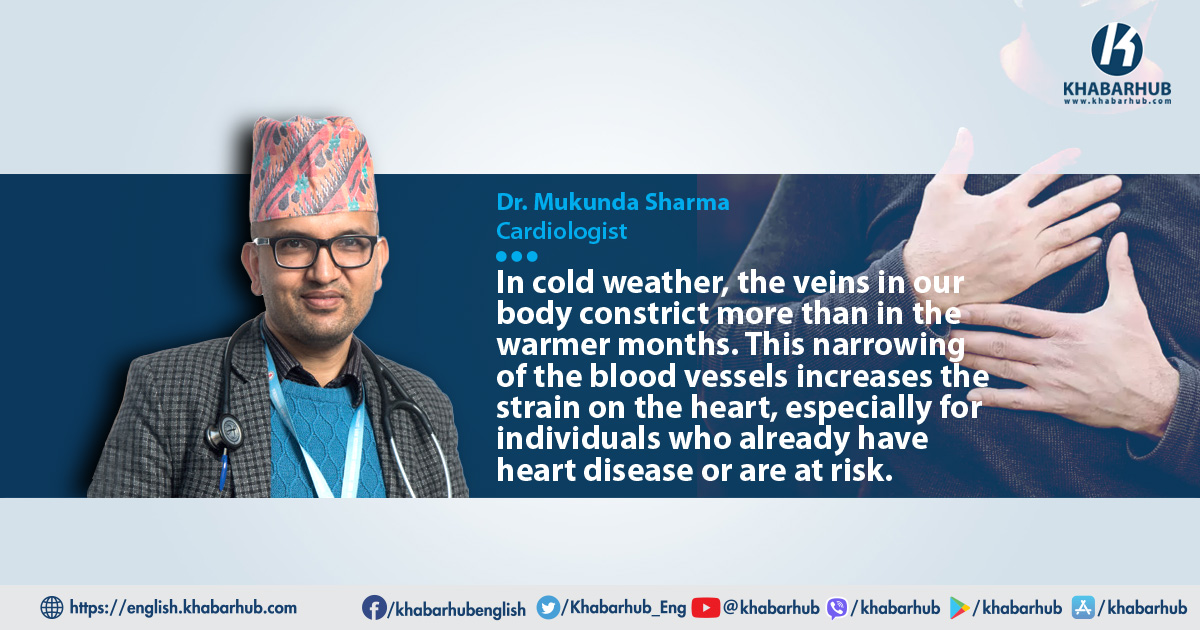KATHMANDU: As cold weather sets in, various health issues tend to surface, with an increasing number of heart-related problems among younger individuals due to factors like diet and lifestyle.
According to doctors, cold temperatures cause the arteries in our body to constrict, which puts additional strain on the heart. As a result, high blood pressure and the risk of heart attacks are more prevalent during this season.
Experts emphasize the importance of monitoring diet and other health habits, as people with pre-existing conditions such as heart disease, obesity, diabetes, high cholesterol, as well as children and the elderly, are at greater risk.
Why does cold weather pose a higher risk for heart patients? Who is most vulnerable to heart disease? How can you identify heart-related issues? What are the warning signs of heart problems? And what preventive measures can you take?
To shed light on these questions, we spoke with Dr. Mukunda Sharma, a cardiologist at HAMS Hospital.
Why is cold weather particularly risky for heart patients?
In cold weather, the veins in our body constrict more than in the warmer months. This narrowing of the blood vessels increases the strain on the heart, especially for individuals who already have heart disease or are at risk.
Even if blood pressure is considered “normal” at 140/90, it can still gradually harm the kidneys. When blood pressure exceeds these levels, the damage occurs much more rapidly.
For instance, patients who are on medication for high blood pressure may find that their blood pressure increases due to this constriction.
In some cases, the amount of medication they are taking may not be enough to counter the effects of the narrowed veins.
Additionally, individuals with small or narrow heart arteries may face even greater risks, as these arteries become even more constricted in cold weather.
This can lead to serious complications such as brain strokes and bleeding in the brain, all of which are caused by the narrowing of blood vessels.
Who is at a higher risk of developing heart disease, especially during the colder months?
There are several factors that can increase the risk of heart disease, particularly personal habits. People who smoke or drink alcohol are at a higher risk.
Unfortunately, many young people are developing habits like smoking and drinking alcohol from an early age, which significantly increases their risk.
Age also plays a role; as people get older, the likelihood of developing high blood pressure increases.
Another major factor is family history. If someone in the previous generation had heart disease, it puts the next generation at higher risk.
People with diabetes, high blood pressure, high cholesterol, and obesity are also at greater risk. Additionally, those who reduce physical activity or neglect their diet are more vulnerable to heart disease.
There are essentially two groups of heart patients: those who can improve their condition through lifestyle changes, and those who are more affected by hereditary factors.
For the first group, paying attention to personal habits—such as following a healthy diet, exercising regularly, losing weight, and controlling blood pressure—can reduce the risk by more than half.
However, it’s difficult to control heart disease risk factors caused by genetics. For these patients, controlling blood pressure through medication and maintaining a heart-healthy diet are essential. They should also follow their doctor’s advice for lifestyle changes.
What is the main reason blood pressure tends to increase in cold weather?
The primary reason is the constriction of blood vessels. When our veins narrow in response to cold, the heart is put under more strain, causing blood pressure to rise.
Another contributing factor is that people tend to eat more and exercise less during the colder months, both of which can exacerbate the rise in blood pressure.
As a result, we see more patients with high blood pressure coming to the hospital during winter compared to the summer months.
At what age is the risk of heart disease highest in winter?
The risk of heart disease increases in winter, particularly when the body temperature drops below 35°C (95°F).
When this happens, our body is unable to produce enough energy to sustain the cells we need, which can be especially dangerous for children and the elderly.
In such situations, the body is unable to generate the energy it requires, putting these vulnerable groups at a higher risk. In extreme cases, this can even lead to death.
We often hear of children and the elderly succumbing to the cold during winter. This is because, when the body temperature drops, brain cells, like other cells in the body, begin to die.
Similarly, heart cells also die, which can lead to complete organ failure. This is why severe cold can be fatal for those at high risk.
How do you know if you have a heart problem? What are the symptoms?
Heart problems can manifest in various forms, and one of the most common is high blood pressure.
Many people experience symptoms like headaches and dizziness when they have high blood pressure, but some individuals may not show any symptoms at all. This is particularly concerning, as those without symptoms are at greater risk.
As people age, or due to poor diet and lifestyle choices, the risk of high blood pressure increases. Additionally, if there is a family history of high blood pressure, the risk is even higher.
Therefore, it is crucial to regularly monitor your blood pressure to detect any issues early and reduce the risk of heart disease.
Some common symptoms may appear before a heart attack. For instance, if you experience chest tightness or pain, it is crucial to seek medical attention immediately.
If a heart attack has already occurred, symptoms such as intense chest pain, sweating, and fainting are typically observed.
Is high blood pressure more dangerous in cold weather?
Recently, many people have lost kidney function due to high blood pressure. Is the risk of kidney damage higher in cold weather?
High blood pressure itself is not a disease but a risk factor that can lead to other serious health conditions. It doesn’t just affect the kidneys but can damage other vital organs in the body as well.
If blood pressure drops due to cold weather, it is important to keep the body warm and offer hot, liquid foods to help restore circulation. Though low blood pressure is concerning, it does not pose the same immediate risk as high blood pressure.
Even if blood pressure is considered “normal” at 140/90, it can still gradually harm the kidneys. When blood pressure exceeds these levels, the damage occurs much more rapidly.
In addition to the kidneys, high blood pressure can lead to thickening of the heart muscle, swelling of the heart chambers, and rupture of brain vessels, which may result in paralysis.
Therefore, it is essential to maintain blood pressure within the range of 110/70 to 120/80 to protect your health.
How many heart patients visit the hospital during cold weather?
Every winter, many patients with uncontrolled high blood pressure visit the hospital. This year is no different, with such patients coming in daily.
The number of people experiencing heart attacks in the emergency room is also higher during the cold season, as well as those suffering from paralysis caused by high blood pressure.
This pattern is not limited to Nepal but is seen worldwide, as cold weather is considered a significant risk factor for heart patients.
Does low blood pressure also occur in cold weather?
Low blood pressure can also occur in cold weather. When the body temperature drops below 35°C (95°F), it is considered a sign of low blood pressure.
Just as high blood pressure increases the risk of heart attack, low blood pressure can damage the kidneys and disrupt blood flow to vital organs. However, the risks associated with low blood pressure are not as severe as those caused by high blood pressure.
If blood pressure drops due to cold weather, it is important to keep the body warm and offer hot, liquid foods to help restore circulation. Though low blood pressure is concerning, it does not pose the same immediate risk as high blood pressure.









Comment